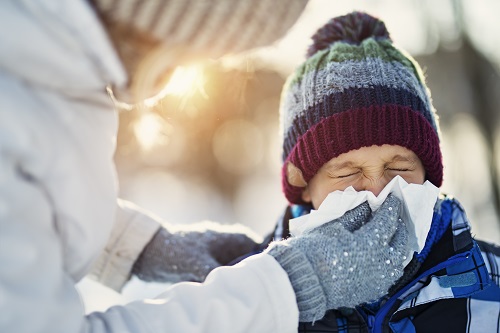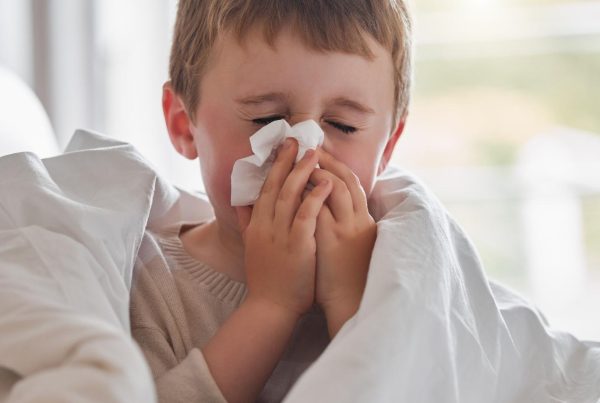MetroHealth pediatrics providers are right around the corner. Visit www.metrohealth.org/pediatrics
As parents know all too well, winter is the season for sniffling, coughing, sneezing, sore throats and upset stomachs.
Here’s a list of common illnesses, steps to take at home to ease your little ones’ symptoms, and when to see a doctor, according to Rashmi Shekhawat, MD, a MetroHealth pediatrician. “Many illnesses are caused by viruses and need to run their course,” she says. “Those that are bacterial can be treated with antibiotics.”

Home Remedies to Relieve Symptoms
Regardless of the cause of illness, Dr. Shekhawat says several home remedies can help relieve symptoms.
Fever: Talk to your pediatrician about the proper dose of over-the-counter acetaminophen (Tylenol) or ibuprofen (Motrin) for your child. (Ibuprofen should not be used in babies less than 6 months of age.) While package instructions are a general guide, dosing should be based on a child’s weight.
Nausea and vomiting: “For stomach upset, the most important thing for parents to remember is to keep their kids hydrated,” says Dr. Shekhawat. Electrolyte drinks like Pedialyte can help with hydration. And, if you’re a mother who is breastfeeding, continue to do so. Breast milk contains antibodies that can help fight off infection.
Stuffy nose and cough: A vaporizer can loosen mucus in the nose and lungs. Vapor rub can help to open nasal passages. Saline drops for a stuffy nose are also useful.
Sore throat: A teaspoon of honey can help soothe a sore throat. However, children younger than twelve months old should not be given honey. A cool-mist humidifier can soothe throats of all ages.
When to See a Doctor
While it may be your instinct to take your child to the doctor every time he or she has a fever, a visit may not always be necessary.
“It’s important for parents to realize that a fever is not an illness, it is a symptom of underlying illness,” says Dr. Shekhawat. “Your child may have a fever with an illness. If your child is active, eating well and breathing regularly, it is okay to give medicines for fever. Please seek medical attention and see your doctor if your child is inactive, lethargic, decreased urination, difficulty breathing, or shortness of breath. ”
Regardless of what virus is causing an upset stomach, if your child is alert and able to keep fluids down, he or she typically doesn’t need to see the doctor. However, if your child is urinating less, a sign of dehydration, see your pediatrician.
Fortunately, “MetroHealth’s multiple pediatric clinics are conveniently located near most Cleveland area neighborhoods,” says Dr. Shekhawat.
6 Tips for Stopping the Spread of Winter Bugs
- Teach your kids to wash their hands with soap and water, especially after going to the bathroom and before eating meals.
- Don’t let your kids share cups or glasses while sick.
- Ask them to cough or sneeze into their shirt sleeve.
- Sterilize baby bottles and pacifiers well.
- Wash plastic toys and let them air dry.
- Follow your child’s school guidelines for keeping kids home. If they have a bad cough, diarrhea, are vomiting or have a fever, they should take a sick day (or two).
To find a pediatric provider near you, visit metrohealth.org/pediatrics or call 216-778-2222.
Contributor:

Rashmi Shekhawat, MD
Pediatrics











